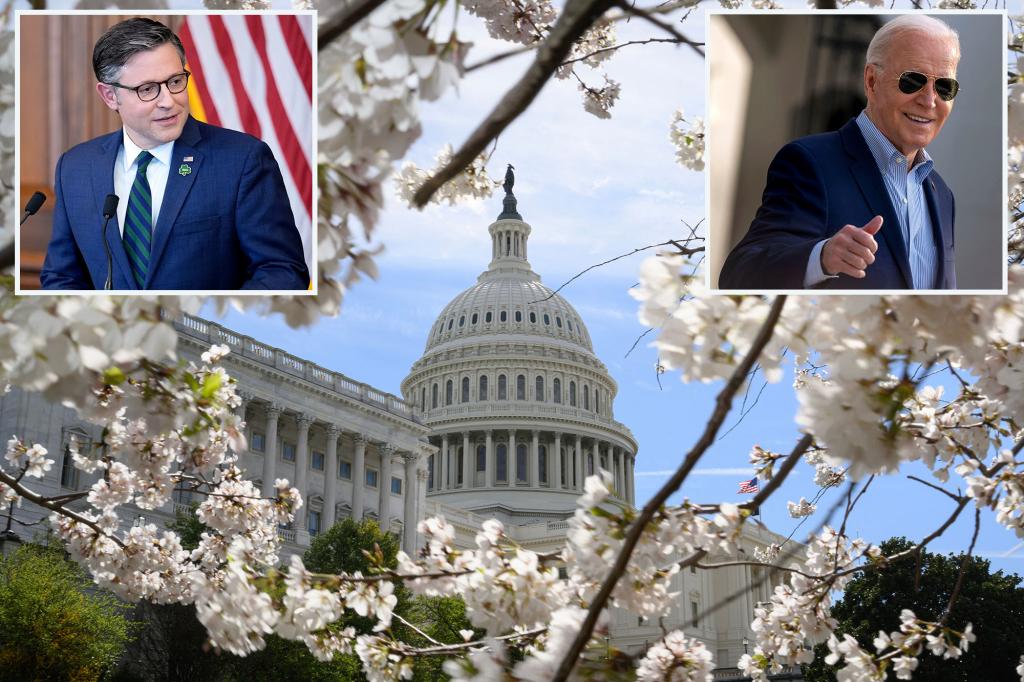politics
Congressional leaders agreed late Monday on a final version of the government funding bill, ending the fiscal battle through the end of September if it passes both chambers by 11:59 p.m. Friday. .
The six bills fund the Department of Defense, State Department, Labor Department, Health and Human Services Department, Department of Homeland Security, and the Legislature through September 30, the last day of fiscal year 2024, and cover the bulk of federal spending. do. $467.5 billion “minibus” Congress passed on March 8th.
The bill made it to President Biden's desk hours before the partial shutdown, despite opposition from fiscal hawks in both chambers of Congress, and was approved by the Departments of Veterans Affairs, Agriculture, Transportation, Commerce, Justice, Housing and Urban Development. It also included funding for the Ministry of Development. such as the Food and Drug Administration and military construction.
Combined, the discretionary bills bring the total to $1.66 trillion, the highest level of spending this year set by Senate Majority Leader Chuck Schumer (D-N.Y.) and House Speaker Mike Johnson (R-Louisiana) in January. reach.
The House approved $886 billion for Pentagon operations in December, but non-defense discretionary spending in the Schumer-Johnson deal stands at $704 billion, some of which has already been passed.
“We have reached an agreement on DHS spending that will allow us to complete the fiscal year 2024 spending process,” Johnson, 52, announced in a statement Tuesday morning.
He also referenced the March 22 closure date and said, “The House and Senate committees will begin drafting the text of the bill to be ready for presentation and consideration by the full House and Senate as soon as possible.” I did,” he added.
Biden, 81, promised in a separate statement about the funding deal that he would “sign it immediately.”
It is unclear when the text of the bill will be published or whether Prime Minister Boris Johnson will give MPs the promised 72 hours they have to read the bill before scheduling a vote.
Congress may need to pass stopgap measures to buy more time and keep spending at current levels.
Johnson last week warned that the spending bill would be introduced before emergency additional military aid to Ukraine, Israel and Taiwan could be considered, as far-right House Republicans campaigned against Kiev's support for the war. told the Post that it was “important.”
“There is right and wrong, and in my opinion there is good and evil, and Ukraine is the victim here… they were invaded,” he asserted, adding that “the prolongation of the process is… “Because the White House is unwilling or unwilling.” We are unable to provide you with the answers you need to process it faster. ”
Negotiations on immigration have also stalled, with Prime Minister Boris Johnson including a “dead on arrival” border bill in an earlier supplemental package, calling an “open” US border “the greatest disaster of our lifetime”. He blamed the White House for this.
“These issues are still unresolved,” he said, without indicating whether the House would vote on another border bill in addition to funding for foreign allies.
House Majority Leader Hakeem Jeffries (D-N.Y.) said Monday night that the impasse in government spending negotiations “is related to the diversion of Homeland Security funds” before the conclusion between the White House and Republicans. said in a statement.
Unlike the other five bills, DHS funding is expected to be passed as a continuing resolution that would slightly increase spending from fiscal year 2023 levels, according to reports.
Mr. Johnson, Mr. Jeffries, Mr. Schumer, and Senate Minority Leader Mitch McConnell (R-Ky.) all thanked all of Congress' leading budget spenders for getting the package done.
“I thank Senator Collins for tirelessly advancing Republican priorities, including emergency resources for our national defense, as the bill's language is finalized,” McConnell said. said in X. “It's time for Congress to finish our job.”
On Monday, members of the House Freedom Caucus called on Republican lawmakers to oppose a second round of spending “to block Mr. Biden's open border policies.”
“The House must pass a spending measure that compels the inclusion of core elements of HR2,” said Freedom Caucus Chairman Bob Good (R-Va.) and Rep. Chip Roy (R-Texas). state) and 41 other Republican lawmakers said in the letter. Dear Colleague” letter.
Lawmakers urged other lawmakers to veto the spending package without including provisions that would push for more wall construction on the U.S.-Mexico border, block illegal immigration between ports of entry, and reduce eligibility for asylum claims. Ta.
The bill also reinstated the Trump administration's “remain in Mexico” policy, which forced immigrants to wait for immigration court hearings south of the U.S. border.
At least 83 House Republicans and 21 Senate Republicans voted against previous spending policies, while two House Democrats and Sen. Chris Murphy (D-Conn.) voted to “reverse fiscal policy.” He accused Republicans of “burying” a controversial provision that would have allowed the government to do so. Firearm background check system. ”
Politico reports that Johnson has also promised to take up the Foreign Intelligence Surveillance Act (FISA) reform bill in April, a priority for both his conference and Democrats due to data privacy concerns. It becomes.
Load more…
{{#isDisplay}}
{{/isDisplay}}{{#isAniviewVideo}}
{{/isAniviewVideo}}{{#isSRVideo}}
{{/isSR video}}


